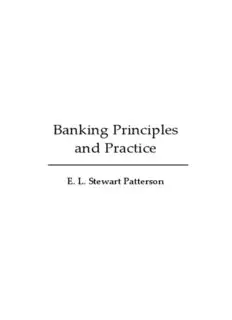Table Of ContentBanking Principles
and Practice
E. L. Stewart Patterson
BANKING PRINCIPLES AND PRACTICE
BY E. L. STEWART PATTERSON
SUPERINTENDENT OF EASTERN TOWNSHIP BRANCHES,
CANADIAN BANK OF COMMERCE
MODERN BUSINESS: VOLUME 16
A SERIES OF TEXTS PREPARED AS PART OF THE MODERN
BUSINESS COURSE AND SERVICE OF THE ALEXANDER
HAMILTON INSTITUTE
1917
Copyright © 2009 Dodo Press and its licensors. All Rights Reserved.
CONTENTS
PREFACE
PART I.. BANKING PRINCIPLES.
CHAPTER I. HISTORICAL SKETCH
CHAPTER II. KINDS OF BANKS
CHAPTER III. THE BANK ACT
CHAPTER IV. THE BANK ACT (CONTINUED)
CHAPTER V. NOTE ISSUES AND THE BRANCH SYSTEM.
CHAPTER VI. ANALYSIS OF A BANK STATEMENT.
PART II BANKING PRACTICE.
CHAPTER I. HEAD OFFICE
CHAPTER II. HEAD OFFICE RECORDS
CHAPTER III. THE BRANCH STAFF
CHAPTER IV. BRANCH BOOKS AND RECORDS.
CHAPTER V. DEPOSIT BUSINESS
CHAPTER VI. LOANING A BANK’S MONEY
CHAPTER VII. CLASSIFICATION OF LOANS.
CHAPTER VIII. ADVANCES ON WAREHOUSE RECEIPTS AND
ASSIGNMENTS.
CHAPTER IX. INTERNAL INSPECTION
CHAPTER X. BANK COST ACCOUNTING.
PREFACE
It would be impossible within the narrow confines of one volume to
deal exhaustively with so extensive a subject as that of Canadian
banking practice, but it is hoped that the parts of this subject dealt
with herein will be found to be treated with due regard to their
relative importance, and that no really essential information has been
overlooked. As far as possible, all matters coming within the scope of
the Bills of Exchange Act have been purposely omitted, because an
intimate knowledge of the act itself is essential to every business
man and banker.
Altho Canadian banks may differ in bookkeeping and methods, the
general principles and aims of their systems are the same, and the
reader should have no difficulty in understanding the forms and
methods explained in the Text, and in interpreting them by his own
experience. Too specific explanations have been avoided as far as
possible, lest the principles involved should be buried under a mass
of detail.
The present edition of the Text has been revised and brought down
to the end of 1916; the bank and other financial statements presented
reflect conditions existing prior to the commencement of European
hostilities, inasmuch as these statements represent the ordinary
position of the banks. More recent statemerits reflect the abnormal
conditions induced by the war, and are therefore but of temporary
interest.
E. L. Stewart Patterson. Sherbrooke, Que.
Banking Principles and Practice
PART I.. BANKING PRINCIPLES.
CHAPTER I. HISTORICAL SKETCH
1. Introduction
In an intelligent study of the Canadian banking system particular
stress should be laid on the fact that the system has been evolved,
not made; that it has grown up with the country, suffered with it,
prospered with it and, since the Confederation, been the backbone of
commerce and agriculture. The careful decennial revisions of the
banking laws have kept the system continually in touch with the
requirements of Canada’s constantly altering conditions. In fact, in
no other country does the history of bank-ing support so forcibly the
contention of Horace White in his “Money and Banking”:
The principles of banking are the outgrowth of experiment. They
must be learned from the history of banking and particularly from
the laws that have been enacted from time to time. These laws are
the crystallization of ideas dominant at given periods.
The history of banking in Canada may be roughly divided into four
periods:
New France.....................1608-1763
British Occupancy ...............1763-1817
Provincial Banking...............1817-1867
National Banking System.........1867
2. New France
During this period (1608-1763)-Canada had its first, and it is to be
hoped its last, experience in “fiat” money. In lieu of a better
circulating medium, beaver and other furs, wheat and tobacco were
1
Banking Principles and Practice
accepted in trade, and tho at first the issue of government obligations
in the shape of “or-donnances” and card money were a welcome
relief, the scandalous abuse of this privilege quickly brought it into
disrepute, for no matter in what form, or under what conditions
these obligations were issued, they all traveled the same road to
ultimate depreciation.
The country found itself at the time of the capitulation, in 1760,
loaded with a tremendous debt of over 80,000,000 livres outstanding,
of which some 34, -000,000 livres were in ordonnances, 7,000,000 in
card money and treasury bonds and the balance in other forms of
obligation. This formed one of the most difficult problems that
confronted the British government and, notwithstanding the
impoverished condition of France, the British insisted upon a
definite basis of settlement. Accordingly, a convention was signed in
1766 under which bills of exchange and kindred obligations were to
be redeemed by the French government at 50 per cent of their face
value, and ordonnances and other forms of debt at 25 per cent.
Owing to circumstances which need not be entered into here, the
unfortunate holders eventually received only a moiety of this
settlement.
The history of this period presents an instructive lesson on the evils
of money issued on credit only, even tho the credit is that of a
government. There is no doubt that Alexander Hamilton had the sad
experience of New France before him when he made his severe
stricture on government issues based on credit. In his report on
banking in 1790, he said:
The emitting of paper money by the authority of the government is
wisely prohibited to the individual states by the national
constitution, and the spirit of this prohibition ought not to be
disregarded by the government of the United States. Tho paper
emissions under a general authority might have some advantages
not applicable and be free from some disadvantages which are
applicable to the like emissions by the states separately, yet they are
of a nature so liable to abuse, and it may even be affirmed so certain
2

